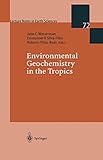Environmental geochemistry in the tropics [Libro electrónico] / editores: Julio C. Wasserman, Emmanoel V. Silva-Filho, Roberto Villas-Boas
Wasserman, Julio C [editor] | Silva-Filho, Emmanoel V [editor/a] | Villas Boas, Roberto C [editor/a].
Tipo de material: Libro
en línea Series Editor: New York, New York, United States: Springer, c1998Descripción: xiv, 305 páginas : ilustraciones ; 23 centímetros.ISBN: 3540637303; 9783540637301 (Print); 9783540696384 (Online).Tema(s): Environmental geochemistry -- TropicsNota de acceso: Disponible para usuarios de ECOSUR con su clave de acceso Nota de bibliografía: Incluye bibliografía e índice: páginas 295-305 Número de sistema: 55829Contenidos:Mostrar
Resumen:
Libro
en línea Series Editor: New York, New York, United States: Springer, c1998Descripción: xiv, 305 páginas : ilustraciones ; 23 centímetros.ISBN: 3540637303; 9783540637301 (Print); 9783540696384 (Online).Tema(s): Environmental geochemistry -- TropicsNota de acceso: Disponible para usuarios de ECOSUR con su clave de acceso Nota de bibliografía: Incluye bibliografía e índice: páginas 295-305 Número de sistema: 55829Contenidos:Mostrar
Resumen:| Tipo de ítem | Biblioteca actual | Colección | Signatura | Estado | Fecha de vencimiento | Código de barras |
|---|---|---|---|---|---|---|
| Libros | Biblioteca Electrónica Recursos en línea (RE) | Acervo General | Recurso digital | ECO400558296632 |
Incluye bibliografía e índice: páginas 295-305
1. Trends in environmental geochemistry in tropical countries.. 2. Paleoclimate studies in Brazil using carbon isotopes in soils.. 3. Soil-to-plant transfer of 137Cs related to its geochemical partitioning in Oxisols of tropical areas.. 4. Speciation, reactivity and mobility of toxic elements in soil systems.. 5. Key role of flow velocity and pH in the lixiviation of mineral-forming elements.. 6. Spatial distribution and seasonal patterns of aquatic emergent plants in Southeast Brazil: Development of a tool for mass balances.. 7. Instrumental multi-element analysis in plant materials: A modern method in environmental chemistry and tropical systems research.. 8. Chemistry and distribution of trace elements in the Patos lagoon, South Brazil.. 9. Mass balance estimation of natural and anthropogenic heavy metal fluxes in streams near the camaquã copper mines, Rio Grande do sul, Brazil.. 10. A model for geochemical partitioning of heavy metals in the mar del Plata coastal ecosystem, Argentina.. 11. Mangrove swamps of the Subaé and Paraguaçú tributary rivers of Todos os Santos Bay, Bahia, Brazil.. 12. Metal scavenging and cycling in a tropical coastal region.. 13. Mercury behaviour in sediments from a sub-tropical coastal environment in SE Brazil.. 14. Diagnosis of environmental problems related to vein gold mining in Colombia.. 15. Assessment of the heavy metal pollution in a gold "garimpo".. 16. Mercury partitioning within alluvial sediments of the Carson river valley, Nevada: Implications for sampling strategies in tropical environments.. 17. Hydrogeochemical description of groundwaters from a coastal region of Rio de Janeiro state, Brazil.. 18. Long term atmospheric aerosol characterization in the Amazon Basin.. 19. Are tropical estuaries environmental sinks or sources?.. Index
Disponible para usuarios de ECOSUR con su clave de acceso
Held in 1993 in Niterói, Brazil, the first International Conference on Environmental Geochemistry in Tropical Countries established a starting point for this book. The book opens with a discussion of the points that arose during the closing session, summarised by Dr. E.K. Duursma: The Environment in the Tropics Remains Unknown. Most of the processes that occur in temperate environments turn out to be completely different in the tropics. This can already be seen in Chapter 3, where estimates of radionuclide transfer factors reach values considerably greater than in temperate areas. The utilisation of variables measured in temperate environments for modelling of the tropics can result in completely erroneous conclusions and, worse, inefficient remediation solutions. eng
Disponible en línea
Disponible en formato PDF
Subscripción a ELSEVIER 26 de diciembre del 2013
